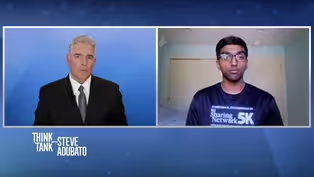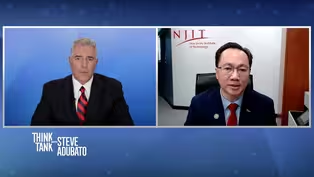
Addressing Homelessness and Small Business in Newark, NJ
Clip: 6/22/2024 | 9m 10sVideo has Closed Captions
Addressing Homelessness and Small Business in Newark, NJ
Steve Adubato connects with Evan Weiss, President and CEO of the Newark Alliance, to discuss Newark's efforts in addressing homelessness and how the organization supports small businesses in the city.
Problems playing video? | Closed Captioning Feedback
Problems playing video? | Closed Captioning Feedback
Think Tank with Steve Adubato is a local public television program presented by NJ PBS

Addressing Homelessness and Small Business in Newark, NJ
Clip: 6/22/2024 | 9m 10sVideo has Closed Captions
Steve Adubato connects with Evan Weiss, President and CEO of the Newark Alliance, to discuss Newark's efforts in addressing homelessness and how the organization supports small businesses in the city.
Problems playing video? | Closed Captioning Feedback
How to Watch Think Tank with Steve Adubato
Think Tank with Steve Adubato is available to stream on pbs.org and the free PBS App, available on iPhone, Apple TV, Android TV, Android smartphones, Amazon Fire TV, Amazon Fire Tablet, Roku, Samsung Smart TV, and Vizio.
Providing Support for PBS.org
Learn Moreabout PBS online sponsorship- We're joined once again by Evan Weiss, who's President and CEO of the Newark Alliance.
Evan, good to see you again.
- Good to see you, Steve.
- We'll put up the website of the Alliance.
Tell everyone what it is.
- Newark Alliance, actually, we're turning 25 this year.
We're an economic development entity in Newark, New Jersey.
We were founded by Ray Chambers, Art Ryan, the CEO of Prudential, former governor Tom Kean, to drive inclusive economic growth in Newark.
And so we do that in a bunch of ways, which we'll talk about, but we're a membership group, so we're made up of the biggest corporations, universities, hospitals, CDCs, property owners, et cetera, to get our work done.
- One of the areas you're working on a lot has to do with homelessness prevention, working in cooperation with the city.
What is the problem as it relates in Newark as it relates to the homeless population.
A and B.
What are you actually looking to change as it relates to that situation, which communities across this nation are facing?
- So we are doing well, I have to say that, so compared to some of our peer cities across the United States, I think the efforts of the city, of the state of the Alliance have been effective.
We're primarily targeting chronic homelessness, meaning people who have been on the street for a prolonged period of time.
One of the things that surprised me, Steve, when we started working on this, was that you often think of homelessness as being signed that is tied in with mental health, substance abuse, which it absolutely is, but that's not the majority of cases.
It's mostly people who missed, you know, a rent payment, a utility payment, they got in a fight with their spouse.
What we've learned is that it doesn't take that much.
It takes a little over $750 on average to help keep someone out of homelessness.
So we're trying to do that preventative work with our partners and also with the more difficult chronic cases, help folks find the right resources.
- And every community deals with the problem or the issue of homelessness differently.
And I just mentioned this to Evan before we get on the air for this interview.
As we do this program at the end of April, this United States Supreme Court will be hearing a case making a decision.
In Oregon, an Oregon community has passed an ordinance where being homeless is tantamount to a crime and the Supreme Court will determine if it's constitutional or not.
Evan, what do you believe would cause a community, people in a community to wanna pass an ordinance slash law that would identify people who are homeless as criminals?
- You know, I can't speak to that community, obviously, but what I- - Not just that, 'cause they're not alone.
- But I think what people are feeling are, you know, it's been something that we've had in Newark or any city in America for decades, obviously, but the pandemic really heightened it and I think that heightened a lot of pressure.
You see New York City, you know, taking some also pretty aggressive action.
But I think, you know, we start a lot of this work because of what's, you know, been going on at Newark Penn Station.
That's often people's first experience, you know, coming to Newark if they're a student, if they're going to NJPAC, if they're going to work, busiest train station in New Jersey and people see the homeless population there.
And so one option would certainly be, you know, a kind of option that Oregon is pursuing.
What we thought, you know, again with our partners was to try to have a more compassionate and I believe, effective approach, you know, at solving this long term.
- The migrant situation exacerbate the homelessness problem?
- Yes, yes.
- Describe it.
- So at this point in time, Newark has been doing everything it can in New Jersey to try to deal with this as much as we can.
But frankly, New York still remains the epicenter of this in our region.
New York, Chicago, Los Angeles, et cetera.
And so we haven't borne the brunt of it yet, but we know it's coming.
And so we do what we can locally.
We have great partners like in the North Ward, La Casa de Don Pedro, you know, another Newark Alliance member.
But we unfortunately, you know, so much revolves around federal policy and politics that are out of our hands.
And so we try to do as much as we can here, just making sure people can quickly, you know, find support.
- Evan talk about the Halsey Street Project.
Halsey Street is a very significant, historically relevant street in the city of Newark.
What is the Halsey Street Project and why does it matter so much?
- It's about two things, really.
It's about ownership and it's about connection.
So I think on the ownership end, Halsey Street is really interesting where it's right in the middle of the central business district, very unique, where Halsey Street kind of looks like a small town or you know, small town streets in Maplewood or something.
But then a block away is Prudential World Headquarters, Audible's, Rutgers-Newark.
It's all right there.
It's a thriving community, particularly of black entrepreneurs on the street.
But what we've noticed is that, we looked at about 167 properties on Halsey, zero of those, as far as we can tell, with operating businesses, operated by people of color, actually owned by people of color.
And so, what that means to us is that, as Halsey Street continues to rise in its fortunes, we want to make sure that the entrepreneurs that have given so much life to the street have an ownership stake in it.
- So, black and brown folks run the businesses, don't own the businesses?
- Don't own the buildings.
And if I botch that statistic, I think.
- But they don't own the building.
- Yeah, exactly.
So they're renters.
And so, that's what we want to try to improve upon because again, with the enormous amount of investment in Newark right now, this is a chance to have a stake in that and and to grow wealth.
And I think one of the most amazing things about Newark, it's been an engine of wealth creation for generations of people, but a lot of black and a lot of particularly recent immigrants, you know, from Latin America, haven't had that same chance.
And so we're trying to do what we can to correct that.
- Final question about, there's so many aspects of life in Newark.
I think Ken Gibson, the former mayor, said, wherever American cities are going, Newark will quote unquote, and you know the rest of the quote, right?
- [Evan] Get there first.
Yep.
Get there first.
- One of the places we're not getting to first in Newark, excuse me, is internet access.
What is the problem issue with internet access and what are you and your colleagues doing to address it?
- Newark is the center in many ways of the American internet infrastructure, which is an incredible thing.
Right in the old Bambergers store is one of the main hub, you know, for the entire country.
But Newarkers, too many of them, about a quarter, don't have in-home high-speed internet.
And so, what we've been doing with the partnership of Invest Newark and also the federal government and some, you know, great corporate partners and business partners is trying to expand access and make it more affordable to individuals.
And I think the show piece project we've been doing is with the Newark Housing Authority, again, led by Invest Newark, and a company called Andrena, to make sure that people in those buildings have different options for internet access and are price competitive.
So the other thing we've done is put basically what looked like satellite dishes on top of these buildings, which being high as they are, can then kind of beam internet around the neighborhoods and areas that haven't had it historically.
- So many people take it for granted.
And so many folks, I can say it again, one in three or one in four do not have access.
- Yeah so, one in four.
- Just think about what that means, folks, and the impact it would have on your family if you didn't have access.
Evan Weiss is President and Chief Executive Officer of the Newark Alliance.
Evan, thank you as always.
- Thank you, Steve.
Pleasure to be here.
- You got it, I'm Steve Adubato thank you so much for watching.
We'll see you next time.
- [Narrator] Think Tank with Steve Adubato is a production of the Caucus Educational Corporation.
Celebrating 30 years in public broadcasting.
Funding has been provided by PNC Foundation.
RWJBarnabas Health.
Let’s be healthy together.
PSEG Foundation.
Newark Board of Education.
The Fidelco Group.
Horizon Blue Cross Blue Shield of New Jersey.
The North Ward Center.
Veolia, And by The Russell Berrie Foundation.
Promotional support provided by Insider NJ.
And by Northjersey.com and Local IQ.
(Sounds of Water) - (Narrator) Most people don’t think of where there water comes from.
But we do.
Veolia, more than water.
Resourcing the world.
How This Youth Volunteer Is Making Progress In His Community
Video has Closed Captions
Clip: 6/22/2024 | 7m 59s | How This Youth Volunteer Is Making Progress In His Community (7m 59s)
President of NJIT Addresses AI and The Future of Higher Ed
Video has Closed Captions
Clip: 6/22/2024 | 9m 47s | President of NJIT Addresses AI and The Future of Higher Ed (9m 47s)
Providing Support for PBS.org
Learn Moreabout PBS online sponsorship
- News and Public Affairs

Top journalists deliver compelling original analysis of the hour's headlines.

- News and Public Affairs

FRONTLINE is investigative journalism that questions, explains and changes our world.












Support for PBS provided by:
Think Tank with Steve Adubato is a local public television program presented by NJ PBS

